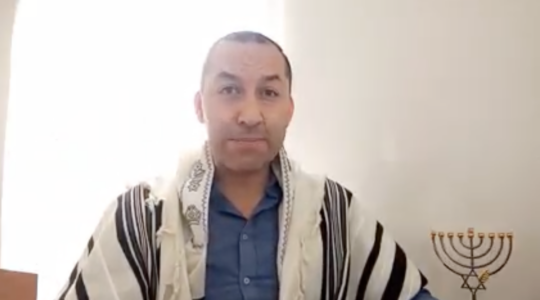(JTA) — After a Polish court tossed out a government regulation permitting kosher slaughter in 2012, Poland’s $500 million ritual slaughter industry was expected to be brought to its knees.
Evidence shows, however, that not only was kosher slaughter still being performed in Poland as recently as this month, but also that kosher meat producers had help in skirting the law from a high-ranking official in the office of Polish Chief Rabbi Michael Schudrich.
JTA has obtained two letters signed by Michael Alper, a top aide to Schudrich, informing Polish officials that several hundred cattle would be slaughtered after being stunned with electric current — a requirement of Polish law that is inconsistent with kosher slaughter, which mandates that animals be killed without prior stunning.
Meat from the slaughterhouse where Alper said stunning would be used was subsequently certified as kosher by the Israeli Chief Rabbinate and several European certifiers before being exported abroad. The European certifiers declined JTA’s request for comment, but several knowledgeable insiders confirmed that the animals were not in fact stunned and that the meat was indeed kosher.
“If there were a kosher concern regarding one of our labels, we would have acted,” Maor Ziv, a spokesman for the Israeli Chief Rabbinate, told JTA.
Under a 2002 amendment to the 1997 law on animal welfare, Poland required that all animals be stunned prior to slaughter. The law appeared to conflict with another measure passed that year guaranteeing religious minorities the right to perform ritual slaughter.
In 2004, the government issued a regulation that aimed to resolve the apparent conflict by exempting Jews and Muslims from the animal welfare law. But in 2012, a constitutional court scrapped the 2004 exemption, effectively banning what had been a $500 million ritual slaughter industry.
Several businesses registered heavy losses and laid off employees as they scrambled to convert their operations or reconfigure themselves as middlemen, purchasing kosher meat produced outside Poland and reselling it for export. But the Alper letters show that some businesses continued to produce kosher meat in Poland and had assistance from inside Schudrich’s office in concealing the operation from authorities.
Schudrich has denied prior knowledge of Alper’s activities and suspended his aide. Alper declined to comment.
In July, Alper sent a letter to a district veterinary inspector requesting permission to slaughter 250 heads of cattle after stunning them with electric current, a formality meant to inform authorities of slaughter activities. A second letter in November requested permission to slaughter an additional 310 cows. The letter is signed “rabbinate coordinator for kosher products in Poland.”
“I am writing to request to carry out the slaughter of 310 heads of cattle on Nov. 24, 2013, with use of electric current to render the animals unconscious,” Alper wrote in the November letter.
The animals mentioned in Alper’s letters were killed at the Biernacki slaughterhouse in Jarocin, 150 miles west of Warsaw. The slaughterhouse, which was one of Poland’s main facilities for kosher meat, included living quarters for the rabbis who performed the actual slaughter cuts.
Several sources who spoke to JTA on condition of anonymity said kosher slaughter was taking place at Biernacki as recently as this month. A spokesman for the slaughterhouse declined to respond to JTA’s inquiries, but emphasized that the facility adheres to Polish and European law.
Only cows are slaughtered at Biernacki, while some labels carrying kosher certification from prominent rabbis are for kosher chicken produced in Poland last year. The labels do not carry the names of the slaughterhouses where the birds were slaughtered, but a well-placed source named two poultry meat producers, Brynek and Grzegorz Tuz, neither of which responded to repeated requests for comment.
Schudrich would not confirm whether commercial kosher slaughter continued in Poland after January 2013, but he called Alper’s letter “a very serious mistake.”
Schudrich also disputed the idea that an actual ban on ritual slaughter is in place, noting that a constitutional court has been reviewing a petition by Jews and Muslims arguing that the two 1997 laws are in conflict.
“The court’s ruling in 2012 is not a ban,” Schudrich said. “It is a case of conflicting legislation that is being reviewed by the Constitutional Tribunal.”
But some fear such nuances will be lost on the general public when Poland’s Channel 1 airs the results of its own investigation next month into the kosher slaughter in Poland. The report will harm efforts to resolve the matter and and become grist for the mill of anti-Semites, according to Rabbi Haim Dov Beliak of Beit Polska, a national umbrella organization for Polish Reform and Progressive congregations.
“Clearly, there has not been a cessation of kosher slaughter,” Beliak told JTA. “Manipulation of the issue of kosher-halal slaughter for political purposes by Polish politicians or Jewish community officials or by various business interests reduces the respect that the practice of keeping kosher deserves. Lying about it erodes the community’s credibility and is quite simply playing with fire.”
Beliak said he fears the report will create the impression that Jews don’t respect Polish law, though he added that kosher slaughter could not have continued without Polish officials looking the other way.
“Ritual slaughter is too big a business for Poland to simply walk away from it,” he said.
Renata Kania, a press officer for Poland’s Ministry of Agriculture and Rural Development, said her office had no immediate comment.
JTA has documented Jewish history in real-time for over a century. Keep our journalism strong by joining us in supporting independent, award-winning reporting.





